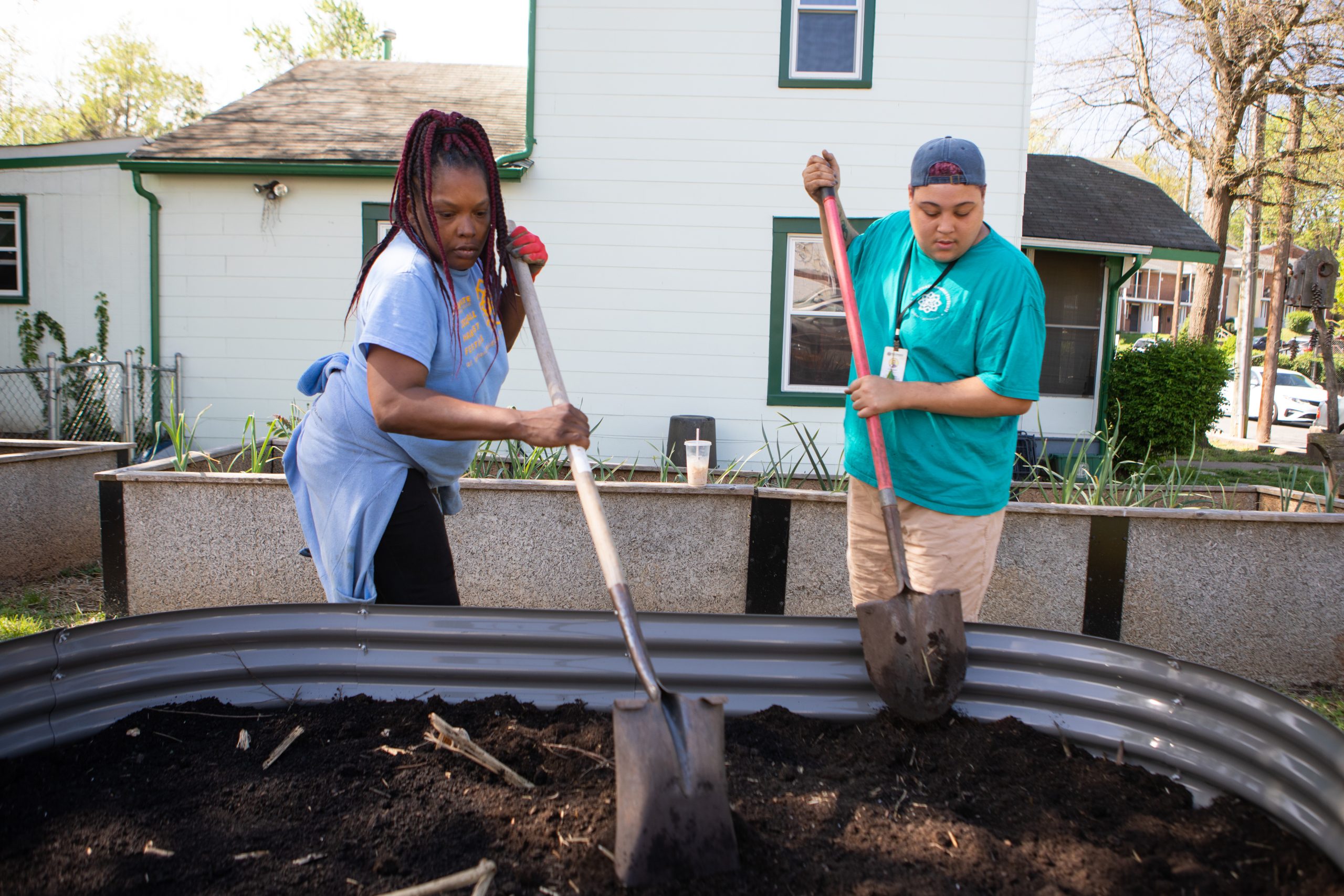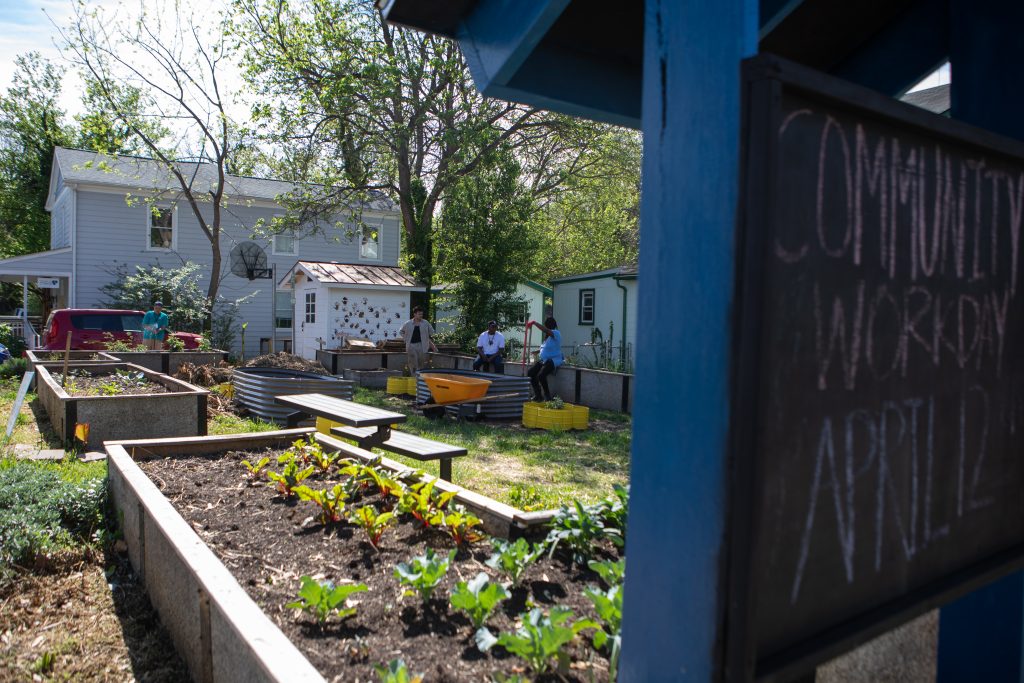Cultivate Charlottesville Is Addressing Food Insecurity at the Roots


By Staff writer I Photos by Kristen Finn
Early morning in one of Cultivate Charlottesville’s partnership gardens located at City of Promise in the West Haven Neighborhood, it is easy to see the physical indication of true collaborative efforts. Cultivate staff, and city residents have worked together to care for the garden complete with a multitude of fresh vegetables including broccoli, greens, and even a banana tree grown using pieces from the parent plant belonging to Joy Johnson, the neighborhood’s eldest living resident. Residents of the neighborhood can come and take what they need from the garden at no charge. This garden, though special, is not a stand-alone passion project, but instead an integral part of the work done through the organization’s efforts to alleviate barriers to food accessibility in Charlottesville, Virginia.
Executive Director, Aleen Carey believes that in reference to the city surrounded by mountains, “We say it’s a foodie town. Everybody talks about gourmet restaurants, farms, wineries. So it’s well known as a foodie town, but it’s not yet a food equity town.” Stepping into the role of director in July, Aleen serves as the successor to the organization’s former Co-directors Jeanette Abi-Nader and Richard Morrison.
Charlottesville’s food insecurity rate affects 17% of the college town’s population. Hearing this statistic may be shocking for some, but if on the side that the rate affects, is unsurprising for others. Food insecurity in short is the term used to describe the inadequate accessibility and availability of nutritional and safe foods to meet one’s basic needs. Since Charlottesville is home to about 46,000 residents, that means that well over 7,000 people face the struggles that food insecurity brings. Cultivate, a non-profit in the city, aims to address the issue by working with youth and community residents to create equitable and sustainable food systems. The community-focused and led organization works to accomplish this goal according to their mission, through garden-based experiential learning, growing and sharing healthy food, amplifying community leaders, and advocating for food justice.
Cultivate Charlottesville Staff pictured left to right: Kellyn Kusyk, KJ Howard, Niko Lewis, and Jennifer Minor
Cultivate’s mission to provide healthy foods to the residents of the city who could benefit the most is achieved by utilizing three programs: City Schoolyard Garden, Food Justice Network, and Urban Agriculture Collective. Envisioned with each program uniquely impacting its participants, each of them works together to bring about the change the organization wishes to see. Partnering with nine Charlottesville City Schools, City Schoolyard Garden educates students on how to grow their own foods, as well as offering them fresh produce to take home. If interested, students have the opportunity to also become Food Justice Interns for the organization which can also lead to growth in the organization as they age, with options available to become Community Apprentices and Advocates.
. The Food Justice Network program partners with over 25 organizations inclusive of food pantries, hospital networks, educational institutions and housing initiatives, this tier works together to pool their resources and implement strategies to achieve food equity and accessibility across the city.
The Urban Agriculture Collective (UAC) is special to Cultivate because it is essentially the programs’ genesis. UAC focuses on working with public housing spaces and their residents to grow food free of charge. Carey states, “Someone said, “Oh, you guys haven’t been around for a very long time,” and I was like, wait, we’ve been around for more than a decade, but Cultivate is the thing that’s newer. So the individual programs, Urban Agriculture Collective, UAC actually started as something called Quality Control Council Farm (QCC.)”. At the time Garrett [Square apartments], and Miss Karen Waters. were the ones who got the QCC farm going. And then one of our current staff members Jennifer Minor was working in the QCC farm from day one. So she’s still a part of the organization. It changed from Quality Control Council Farm to Urban Agriculture Collective of Charlottesville. Now we just call it UAC because it’s part of Cultivate Charlottesville. But those guys started in 2007.” The alignment of these three programs assists Cultivate Charlottesville’s infrastructure to hit on all cylinders to battle food insecurity. Aleen shared that even before the COVID-19 pandemic, Charlottesville faced a higher rate of food insecurity compared to the rest of the state. While the city’s average sits at the aforementioned 17%, the state’s average was just under Charlottesville’s, at 11%. Despite Charlottesville’s deep affluence and abundant food resources available in the well-endowed area, the stark disparity emphasized the need for the organization’s comprehensive approach beyond traditional food assistance programs, thus recognizing the importance of systemic change, Cultivate’s integrated approach focuses on not only offering food support but also advocating for policy changes. 
Cultivate Charlottesville as an entity is taking on the hard work of establishing food security, but Aleen shares that even with all of their successes, there is still much work to be done. “Another thing that we say that can be a little, um, touchy is when you look at the last 40 years, we have not effectively moved the hunger needle. Even though we’ve had some of our organizations, and non-profits in this area working on it, we have not changed it to some great degree. I think that Is the same for the United States, not just Charlottesville. I think that’s how it’s gone. So that’s where we say, if we want to be successful, you have to add the system work.” Carey went on to share that Cultivate wants the city at an organizational and political level, to continue thinking about what it will continue to take to make Charlottesville the food equity town it deserves to be. “…we have been nudging them for sure. We’re in our sixth year of an official partnership with the city that’s called the Food Equity initiative and that is money for us to do this work with them.”
Setting their sights on expanding their reach, the non-profit is working with Charlottesville Parks and Rec to hopefully in the future obtain gardening space at the historic Booker T. Washington Park as well as Benjamin Tonsler Park. Due to Parks and Rec going through a strategic planning phase, the campaign is ongoing.
After a morning of working in the City of Promise garden, Cultivate staff member KJ Howard asked his fellow colleagues who were loading the truck up to head to their next garden site, “Does anyone need any broccoli to plant at their site?” It is this statement alone that captures the spirit of community fostered by Cultivate Charlottesville, where the focus reaches far beyond individual gain to supporting each other for the shared benefit of the public.

Student loans often follow borrowers for years, sometimes decades. Even people who fully understand how much they borrowed can feel...

It was a busy week for RIA aggregators. There were a few large moves, including $235 billion multi-family office Cresset...

Blog Posts Archives UnfavoriteFavorite February 27, 2026 Weave: The Social Fabric Project Subscribe to Weave’s Newsletter This story was originally...